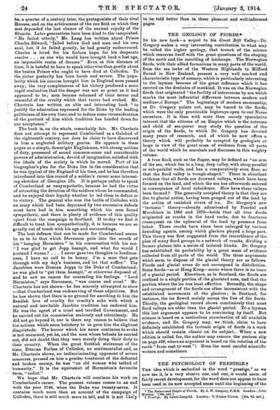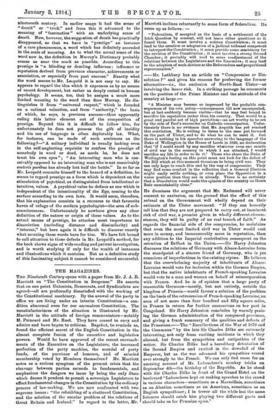THE PSYCHOLOGY OF PRESTIGE.t
Tun idea which is embodied lathe 'word "prestige," as we now aise it, is' A very elusive one, and 'one, it would seem, of fairly recent development; for UM woedloes:not appear to have been used in its now accepted senile' Until the beginning of the Nottrotrigin of Fiords. By J.W.Gregoin.F.8.5. tondos; 'Joan t Pro;tig Dry Lewis Loop*. LOad.,:* -0.06. 6d. int-) -7 . . nineteenth century. In earlier usage It had the sense of "deceit" or "trick," and from this it advanced to the meaning of "fascination" with an underlying sense of deceit. Now, however, the suggestion of deceit has practically disappeared, so that we have in "prestige" an instance of a rare phenomenon, a word which hes definitely ascended in the scale of meaning. As to what the actual sense of the word now is, the definition in Murray's Dictionary probably comes as near the mark as possible. According to this prestige is" a blinding or dazzling influence influence or reputation derived from previous character, achievements or association, or especially from past success." Exactly what the word means to Mr. Leopold it is not easy to say. He appears to regard the idea which it expresses as by no means of recent development, but rather as deeply rooted in human psychology. It seems, too, that he assigns a much more limited meaning to the word than does Murray. He dis- tinguishes it from "universal respect," which is founded on a rational valuation, and from "authority," the basis of which, he says, is previous success—thus apparently ruling this latter element out of the composition of prestige. Beyond this it is difficult to follow him, for unfortunately he does not possess the gift of lucidity and his use of language is often deplorably lax. What, for instance, can be made of such sentences as the following P—" A solitary individual is usually lacking even in the eelf.neglecting requisite to confess the prestige of somebody in word or deed, as needs be, he does not trust his own eyes "; "An interesting man who is con- ceivably opposed to an interesting man who is not conceivably eneterisix■ribue has already lost half the battle." In so far as Mr. Leopold commits himself to the hazard of a definition, he seems to regard prestige as a force which is dependent on the stimulation of psychical. as distinguished from intellectual or intuitive, values. A psychical value he defines as one which is independent of the intentionality of the Ego, coming to the surface according to its own laws. It would seem, therefore, that his explanation consists in a recourse to that favourite haven of refuge of the modern psychologist—the area of :sub- consciousness. Unfortunately he nowhere gives any clear definition of the nature or origin of these values. As to the actual means of prestige, he attaches most importance to dissociation (including distance and dissimilarity) and " interest," but here again it is difficult to discover exactly what meaning these words have for him. We have felt bound to call attention to these defects in Mr. Leopold's method, for the book shows signs of wide reading and patient investigation, and is worth studying if only for the wealth of instances and illustrations which it contains. But as a definitive study of this fascinating subject it cannot be considered successful.



















































 Previous page
Previous page